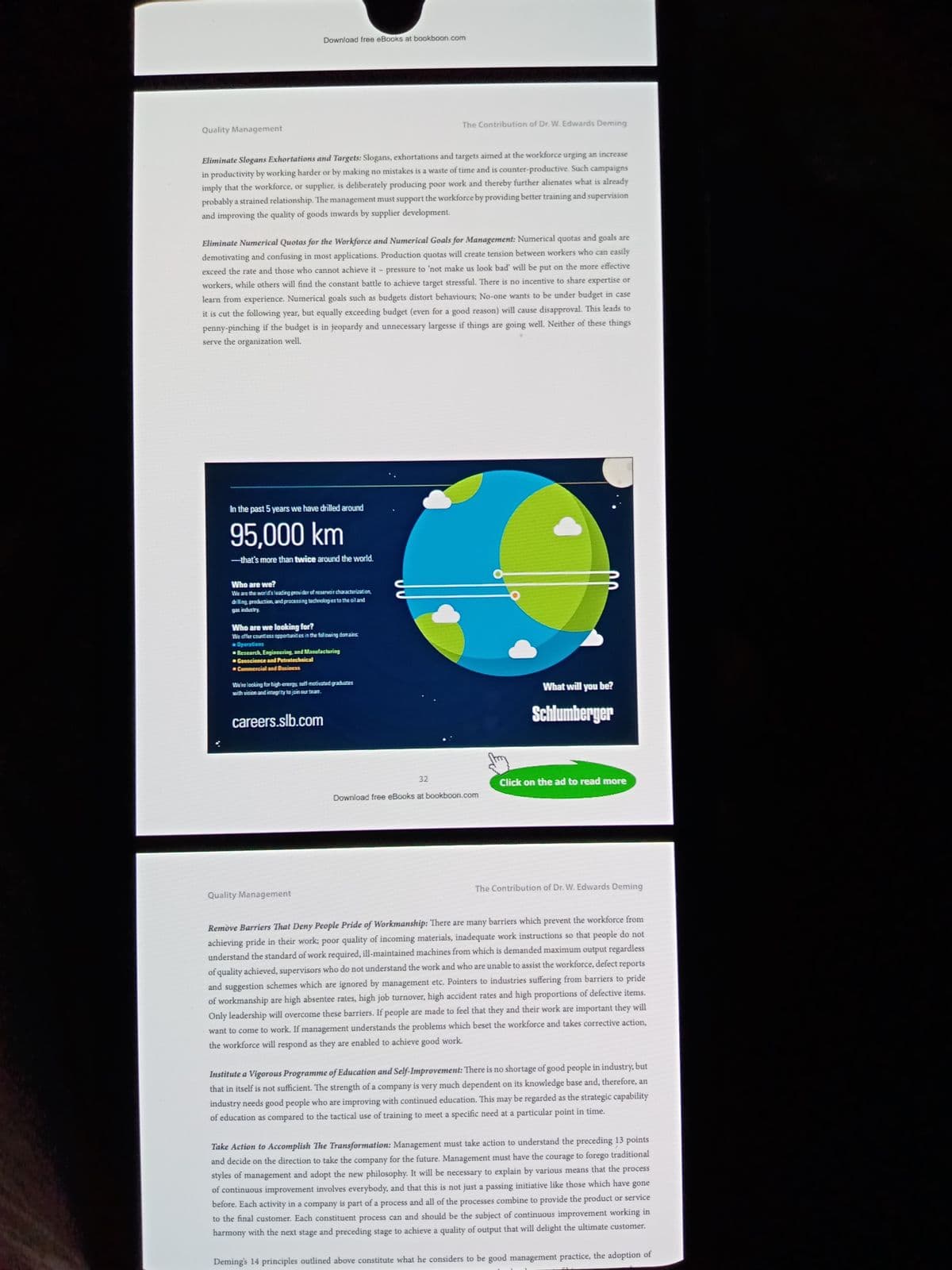Explain in details five of Deming's 14 point of quality management.
Practical Management Science
6th Edition
ISBN:9781337406659
Author:WINSTON, Wayne L.
Publisher:WINSTON, Wayne L.
Chapter2: Introduction To Spreadsheet Modeling
Section: Chapter Questions
Problem 20P: Julie James is opening a lemonade stand. She believes the fixed cost per week of running the stand...
Related questions
Question
Explain in details five of Deming's 14 point of

Transcribed Image Text:Download free eBooks at bookboon.com
The Contribution of Dr. W. Edwards Deming
Quality Management
Eliminate Slogans Exhortations and Targets: Slogans, exhortations and targets aimed at the workforce urging an increase
in productivity by working harder or by making no mistakes is a waste of time and is counter-productive. Such campaigns
imply that the workforce, or supplier, is deliberately producing poor work and thereby further alienates what is already
probably a strained relationship. The management must support the workforce by providing better training and supervision
and improving the quality of goods inwards by supplier development.
Eliminate Numerical Quotas for the Workforce and Numerical Goals for Management: Numerical quotas and goals are
demotivating and confusing in most applications. Production quotas will create tension between workers who can easily
exceed the rate and those who cannot achieve it - pressure to 'not make us look bad' will be put on the more effective
workers, while others will find the constant battle to achieve target stressful. There is no incentive to share expertise or
learn from experience. Numerical goals such as budgets distort behaviours; No-one wants to be under budget in case
it is cut the following year, but equally exceeding budget (even for a good reason) will cause disapproval. This leads to
penny-pinching if the budget is in jeopardy and unnecessary largesse if things are going well. Neither of these things
serve the organization well.
In the past 5 years we have drilled around
95,000 km
-that's more than twice around the world.
Who are we?
We are the world's leating provider of reservoi characterization
driling production, and pracessing technologies to zhe oil and
gas industry.
Who are we looking for?
We offer countiess opportunities in the folowing domains
Operations
Research, Engineering. and Manufacturing
Geoscience and Petrotechnical
Commercial and Business
We're locking for high-energy, self-motiated graduates
mith vision and itegrity to jain our team.
What will you be?
Schlumberger
careers.slb.com
32
Click on the ad to read more
Download free eBooks at bookboon.com
The Contribution of Dr. W. Edwards Deming
Quality Management
Remove Barriers That Deny People Pride of Workmanship: There are many barriers which prevent the workforce from
achieving pride in their work; poor quality of incoming materials, inadequate work instructions so that people do not
understand the standard of work required, ill-maintained machines from which is demanded maximum output regardless
of quality achieved, supervisors who do not understand the work and who are unable to assist the workforce, defect reports
and suggestion schemes which are ignored by management etc. Pointers to industries suffering from barriers to pride
of workmanship are high absentee rates, high job turnover, high accident rates and high proportions of defective items.
Only leadership will overcome these barriers. If people are made to feel that they and their work are important they will
want to come to work. If management understands the problems which beset the workforce and takes corrective action,
the workforce will respond as they are enabled to achieve good work.
Institute a Vigorous Programme of Education and Self-Improvement: There is no shortage of good people in industry, but
that in itself is not sufficient. The strength of a company is very much dependent on its knowledge base and, therefore, an
industry needs good people who are improving with continued education. This may be regarded as the strategic capability
of education as compared to the tactical use of training to meet a specific need at a particular point in time.
Take Action to Accomplish The Transformation: Management must take action to understand the preceding 13 points
and decide on the direction to take the company for the future. Management must have the courage to forego traditional
styles of management and adopt the new philosophy. It will be necessary to explain by various means that the process
of continuous improvement involves everybody, and that this is not just a passing initiative like those which have gone
before. Each activity in a company is part of a process and all of the processes combine to provide the product or service
to the final customer. Each constituent process can and should be the subject of continuous improvement working in
harmony with the next stage and preceding stage to achieve a quality of output that will delight the ultimate customer.
Deming's 14 principles outlined above constitute what he considers to be good management practice, the adoption of
Expert Solution
This question has been solved!
Explore an expertly crafted, step-by-step solution for a thorough understanding of key concepts.
Step by step
Solved in 2 steps

Knowledge Booster
Learn more about
Need a deep-dive on the concept behind this application? Look no further. Learn more about this topic, operations-management and related others by exploring similar questions and additional content below.Recommended textbooks for you

Practical Management Science
Operations Management
ISBN:
9781337406659
Author:
WINSTON, Wayne L.
Publisher:
Cengage,

Operations Management
Operations Management
ISBN:
9781259667473
Author:
William J Stevenson
Publisher:
McGraw-Hill Education

Operations and Supply Chain Management (Mcgraw-hi…
Operations Management
ISBN:
9781259666100
Author:
F. Robert Jacobs, Richard B Chase
Publisher:
McGraw-Hill Education

Practical Management Science
Operations Management
ISBN:
9781337406659
Author:
WINSTON, Wayne L.
Publisher:
Cengage,

Operations Management
Operations Management
ISBN:
9781259667473
Author:
William J Stevenson
Publisher:
McGraw-Hill Education

Operations and Supply Chain Management (Mcgraw-hi…
Operations Management
ISBN:
9781259666100
Author:
F. Robert Jacobs, Richard B Chase
Publisher:
McGraw-Hill Education


Purchasing and Supply Chain Management
Operations Management
ISBN:
9781285869681
Author:
Robert M. Monczka, Robert B. Handfield, Larry C. Giunipero, James L. Patterson
Publisher:
Cengage Learning

Production and Operations Analysis, Seventh Editi…
Operations Management
ISBN:
9781478623069
Author:
Steven Nahmias, Tava Lennon Olsen
Publisher:
Waveland Press, Inc.